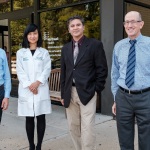Feinstein Institutes reveals outcomes for COVID-19 Acute Kidney Injury hospitalized patients

MANHASSET, N.Y.–(BUSINESS WIRE)–Research from the Feinstein Institutes for Medical Research and Northwell Health’s Division of Nephrology have previously reported that more than one third of the coronavirus disease 2019 (COVID-19) patients who sought treatment at the hospitals of Northwell Health, New York State’s largest integrated health system, developed acute kidney injury (AKI). New research from the largest study of its kind details a more comprehensive look at outcomes for COVID-19 patients with AKI, including kidney recovery, the need for dialytic support and post-discharge care.
AKI is a sudden episode of kidney injury or damage, preventing waste from being filtered within the body and can often lead to death. The outcomes data published in the American Journal of Kidney Disease is a retrospective analysis of electronic health records (EHR) of 9,657 hospitalized COVID-19 patients between March 1 and April 27, 2020.
“Because of the high rates of AKI in COVID-19 patients, it is crucial that we understand how the virus affects recovery,” said Jia H. Ng, MD, a researcher at the Feinstein Institutes and lead author of the paper.
The study found that 39.9 percent (3,854 of 9,657 of patients) developed AKI. While 83.4 percent (3,216) of those patients did not need kidney replacement therapies (KRT), 51.7 percent (1,663/3,216) survived. Importantly, the majority of these patients – 74.1 percent – saw recovery of kidney function at the time of discharge.
Of patients with AKI who required KRT and survived, 66.7 percent (72/108) recovered kidney function. In the remaining AKI-KRT patients, a third (36/108) did not have kidney recovery, of which 91.7 percent (33) who had not previously needed dialysis left the hospitals needing ongoing dialysis care after COVID-19 and AKI.
“It was important to study whether COVID-19 can lead to ongoing kidney problems and we learned that most patients who develop AKI during COVID-19 infection do recover kidney function by the time of hospital discharge,” said Steven Fishbane, MD, an author on the paper and Chief of the Division of Nephrology. “Unfortunately, a small number of patients – about 1 percent – still required dialysis treatment after leaving the hospital.”
“Large-scale research of patient outcomes can lead to a better understanding of the virus’ overall complexity, including its significant impact on the kidneys,” said Kevin J. Tracey, MD, president and CEO of the Feinstein Institutes. “Advancing this knowledge will aid our frontline clinicians to make the most informed and effective decisions while caring for the sickest patients.”
About the Feinstein Institutes
The Feinstein Institutes for Medical Research is the research arm of Northwell Health, the largest health care provider and private employer in New York State. Home to 50 research labs, 2,500 clinical research studies and 5,000 researchers and staff, the Feinstein Institutes raises the standard of medical innovation through its five institutes of behavioral science, bioelectronic medicine, cancer, health innovations and outcomes, and molecular medicine. We make breakthroughs in genetics, oncology, brain research, mental health, autoimmunity, and are the global scientific leader in bioelectronic medicine – a new field of science that has the potential to revolutionize medicine. For more information about how we produce knowledge to cure disease, visit feinstein.northwell.edu.
Contacts
Matthew Libassi
516-465-8325
mlibassi@northwell.edu

